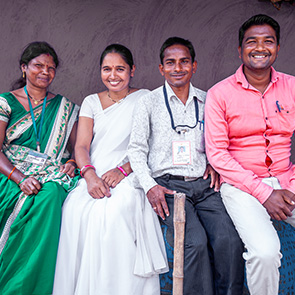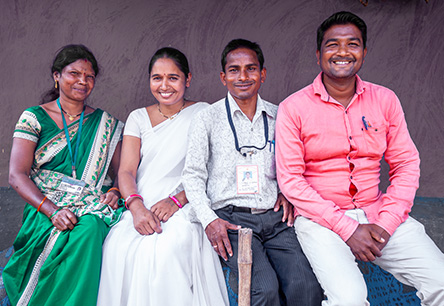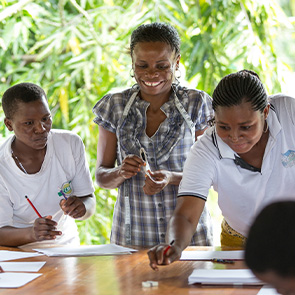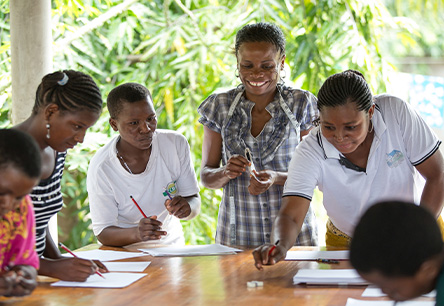The United Nations Sustainable Development Goal 3 urges us all to work toward ensuring healthy lives and promoting well-being for all ages, with a specific target to end epidemics, including HIV, tuberculosis and neglected tropical diseases by 2030. Vaccine protection against, and treatments for, pandemic and epidemic diseases are critical to achieving this goal worldwide.
Providing access to and progressing the development of effective treatments and vaccines to combat some of the world’s deadliest diseases has long been a global public health priority for Johnson & Johnson and an important part of our global health equity strategy. We have amassed more than a century of experience in advancing novel treatment regimens and vaccines and facilitating access to address multiple diseases, including HIV, TB, COVID-19, Ebola and dengue, as well as addressing the growing threat of AMR.
Vanessa Broadhurst
Executive Vice President, Global Corporate Affairs, Johnson & Johnson
Our approach envisions creating a robust health ecosystem to advance the availability and affordability of needed medicines and vaccines and facilitating access for all, including the world’s most vulnerable populations. Efficacious management of vaccine administration, especially to combat urgent outbreaks of disease such as Ebola, can have a transformational impact on public health. Expanding the use of our vaccination monitoring platform (VXNAID), one of our Health for Humanity 2025 Goals, is a crucial step in advancing large-scale immunization to protect people and save lives around the world.
Enabling access to our vaccination monitoring platform
We developed VXNAID, a vaccine-agnostic digital platform that supports adherent vaccine administration in the framework of clinical studies or campaigns. VXNAID is a digital tool that integrates innovative technologies to improve patient tracing, data management and communication to implement impactful vaccination campaigns in resource-limited settings.
Between 2019 and 2021, the platform was deployed in a large-scale Ebola vaccination campaign—called UMURINZI—in collaboration with the Government of Rwanda. UMURINZI was the first large use case of the platform and fully vaccinated more than 203,000 Rwandans against Ebola with the Johnson & Johnson Ebola vaccine regimen, comprising ZABDENO (Ad26.ZEBOV) and Bavarian Nordic’s MVABEA (MVA-BN-Filo).
In 2022, VXNAID was optimized based on the UMURINZI campaign and the second-generation platform shared as an open-source code, enabling global and open access to the platform for any vaccination program.
In 2022, VXNAID was granted Digital Public Good designation by the Digital Public Goods Alliance and has been added to the Digital Public Goods registry.
Health for Humanity 2025 Goals
View ScorecardProgress in Global Access Plans
- Continued evaluation and development of access plans for relevant pipeline assets, including for dengue.
- Specific internal milestones set for 2022 progress were achieved.
On Track
Progress in Preventive Viral Vaccine Capabilities
- Demonstrated supply capabilities and access pathways for the Johnson & Johnson COVID-19 vaccine, including shipping 268 million COVID-19 vaccines in 2022.
- Captured processes internally for future documentation in playbook.
- Internal and external pandemic preparedness activities continue across several potential threats.
On Track
Progress in Vaccination Monitoring Platform
- Platform implemented in 2021 in the WHO Solidarity Trial Vaccines for COVID-19 vaccines and continued in 2022, including expansion to new countries.
- Achieved external endorsement with the designation as a “Digital Public Good (DPG)” by the Digital Public Goods Alliance and addition to the Digital Public Goods registry.
- Optimized platform and shared as an open-source code, enabling global/open access to the platform for any vaccination program.
- Completed registered trademark filing of the platform name: VXNAID.
On Track
In 2021, VXNAID was adopted by the WHO for use in its Solidarity Trial Vaccines (STV), an international, multi-vaccine clinical trial to evaluate the efficacy and safety of COVID-19 vaccines. The use of the platform in the STV program was acknowledged by the WHO in a public statement.27 In 2022, VXNAID was further deployed in the STV program and expanded to other countries.
VXNAID has been shared as an open-source code, enabling global and open access for any vaccination program.
Investing in research where it is needed most
Johnson & Johnson is committed to addressing the dual gap in innovation and health equity through the establishment of the J&J Centers for Global Health Discovery. In joining forces with academic institutions, leveraging regional networks and growing in scope, the Centers provide long-term opportunities to support talent in the discovery sciences and hopefully speed up the discovery of novel mechanisms to tackle expanding and emerging challenges in global health.
William N. Hait, M.D., Ph.D.
Executive Vice President, Chief External Innovation and Medical Officer, Johnson & Johnson
Following the inaugural J&J Satellite Center for Global Health Discovery launch in 2021 at the London School of Hygiene & Tropical Medicine, aimed at developing the next generation of drug regimens needed to treat all forms of TB, we opened two more Satellite Centers in 2022:
South Africa
The Satellite Center for Global Health Discovery at the Holistic Drug Discovery and Development (H3D) Centre, University of Cape Town, focuses on outpacing the rising threat of AMR.
Singapore
The Satellite Center for Global Health Discovery at Duke-NUS in Singapore focuses on catalyzing investment and bolstering discovery of flaviviruses.
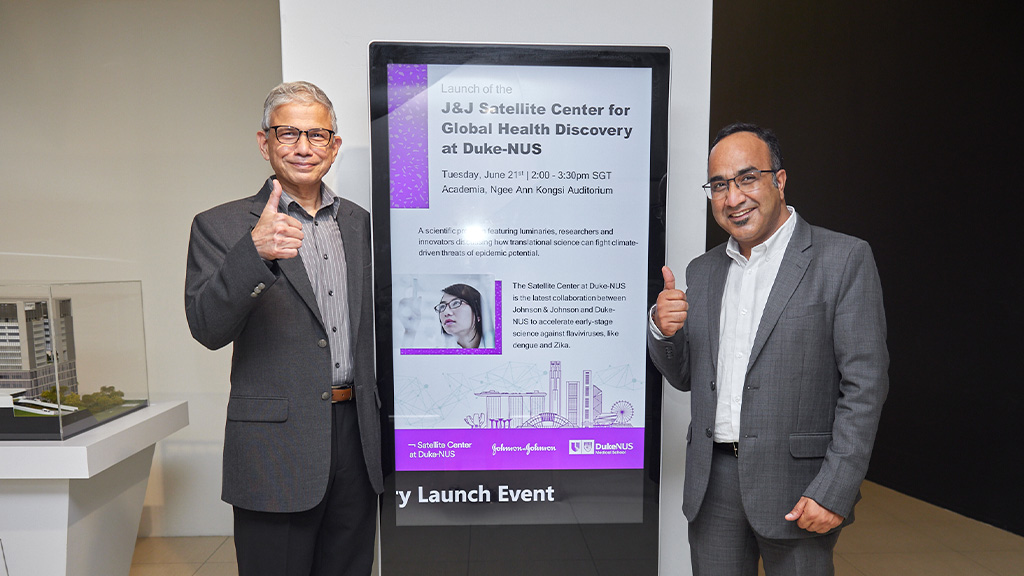
Dr. Anil Koul and Amarnath Sharma at the launch of the J&J Satellite Center for Global Disease Discovery at the Duke-NUS Campus in Singapore.
Collaboration to combat health security threats
In 2022, our BLUE KNIGHT collaboration made further progress with portfolio companies having raised $160 million in secured and contingent funding by the end of the year. The BLUE KNIGHT joint initiative was created between JLABS and the Biomedical Advanced Research and Development Authority (BARDA), part of the Administration for Strategic Preparedness and Response at the U.S. Department of Health and Human Services. It is dedicated to anticipating potential health security threats with the aim of developing effective responses in our rapidly evolving global health environment. BLUE KNIGHT offers physical residency at select JLABS locations, as well as a virtual engagement option, and portfolio companies are eligible to receive access to JLABS resources and programming, along with dedicated mentorship from Johnson & Johnson and BARDA.
BLUE KNIGHT expanded its portfolio of companies to include 27 companies by the end of 2022, of which 36% are female led, 36% are minority led and 68% are first-time entrepreneurs.
Rachel Rath
Director, BARDA Alliance at Johnson & Johnson Innovation, JLABS
Over the last year, we have worked to expand connections and strengthen our potential global impact by growing our portfolio and advancing innovation and collaboration in the following ways:

- Held our second BLUE KNIGHT Symposium, bringing people together virtually and in person at the newly opened JLABS @ Washington, DC, our BLUE KNIGHT hub. The Symposium facilitated a global conversation with innovators, investors, partners and thought leaders to discover and accelerate next-generation solutions for future pandemics, emerging infectious diseases and other known and unknown health threats. More than 1,800 people from 50+ countries registered for the event.
- Launched our first BLUE KNIGHT QuickFire Challenge, inviting innovators from across the globe to submit potentially groundbreaking ideas or technologies that aim to enhance preparedness toward future known and unknown infectious disease threats. Four awardees were selected to take their potential health security solutions to the next level.
Learn more - Enhanced the reach and influence of the BLUE KNIGHT community through participation in several events and congresses, including the Bipartisan Commission on Biodefense meeting, Banding Together: Partnerships for Biodefense. The meeting examined ways to incentivize and manage partnerships between the federal government and industry, academia and NGOs to drive technology innovation and improve biological intelligence for current and future threats. Three BLUE KNIGHT companies presented their next-generation preparedness solutions at the meeting, the first time that early stage companies were invited to speak to the Commission, showcasing the power of public-private partnerships to accelerate scientific and technological advancements.
Brian Wiley
Strategic Advisor, ENA Respiratory, at the Bipartisan Commission on Biodefense meeting
Our COVID-19 vaccine
Acting with urgency at the onset of COVID-19, Johnson & Johnson galvanized resources to help halt the pandemic through developing an easy-to-deploy vaccine, obtaining regulatory authorizations, building supply chain capabilities and engaging with partners around the world to support health systems and healthcare providers involved in combating COVID-19. From the beginning, we identified new and impactful ways to optimize clinical trials, reach diverse communities and ensure appropriate representation from all populations in our research.
In 2021 and 2022, the Johnson & Johnson COVID-19 vaccine received multiple regulatory authorizations, emergency use waivers and import permits in many countries worldwide, including 50 countries in Africa.
Johnson & Johnson delivered more than 268 million COVID-19 vaccines in 2022, with more than 85% launch-to-date shipped to LMICs.
27WHO, “WHO statement on Solidarity Trial Vaccines,” https://www.who.int/news/item/26-10-2021-who-statement-on-solidarity-trial-vaccines.



